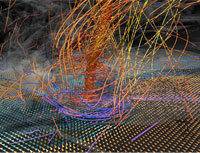Here is the conclusion of the lecture delivered by Stephan Wolfram, titled, Computation & The Future of Mankind, delivered at the Singularity Summit 2011.
The lecture will be in italics in white. Our annotations will be regular type in orange.
The lecture will be in italics in white. Our annotations will be regular type in orange.
See These Pages:
FUTURISM
TECH TRENDS
SINGULARITY
SCIENCE
CENSORSHIP
SOCIAL NETWORKS
eREADERS
MOBILE DEVICES
I talk about everything being possible, but ultimately, we are just physical entities governed by the laws of physics. So an obvious question is what those laws ultimately are. The worldview that I've developed has a lot to say about that too. The real question is if your universe is governed by definite rules, it must in effect be one of those programs that's out there in the computational universe. that is that rule. Now it could be a huge program. It could be that the universe is run by a giant operating system. Or, it could be a tiny program, just a few lines of code.
In the past it would have been inconceivable that all the richness of your universe could be generated just by a few simple lines of code. But once we've seen what's possible and what's out there in the computational universe, it's a whole different story.
Let me not get into this in too much detail now, but it's a big topic. Suffice it to say that if the universe can really be represented by a few simple lines of code, then it's inevitable that that code must operate at a very low level. Below our current notions of space and time and quantum mechanics. I don't think we know apriori whether our universe is a simple program. We know it's not as complicated as it could be, because after all, there is order in the universe. But we don't know how simple it might be. I suppose it seems very much non-Copernican to imagine that our universe happens to be one of the special simple ones. But still if it is simple, we should be able to find just by searching the computational universe of possible universes. And if it's out there to be found, it seems to me kind of embarrassing that we wouldn't at least try to look for it. Which is why when I'm not distracted by fascinating technology, I've worked a lot on doing that kind of search. I had thought that to get anywhere kind of interesting I would have to search from bilions of candidates universes, to find ont that was even vaguely plausible. But I have to say at the front lines of the universe hunt, the easy part os rejecting universes that are obviously not ours. Universes that have no notion of time, or an infinite number of dimensions of space, no notion of causality, or whatever else.
Here's the surprising thing that I found, even in the first thousand universes or so, there are ones that are not obviously our universe. So you run them on our computers, you get billions of little microscopic nodes the model universe is blobbing around, but is it our universe or not? Computational irreducibility bites us once again here, because it tells us that we might have to simulate all the actual steps in the universe here to find out the answer to that question. In practice, I am hopeful that there are enough pockets of computational reducibility, that we'll be able to get a foothold in comparing the laws of the universe that we know.
When one's dealing with sufficiently simple models, it's worth realizing that there are no knobs to turn. I don't know how it will all come out. I think it's far from impossible that in a limited time, we'll effectively hold in our hands, a little program and be able to say, this is our universe, in every precise detail. Just run it and you'll grow our universe and everything that happens in it.
Then, we'll be asking why is it this program and not another? That will be an interesting and strange question. Which I suspect might be resolved as such questions often are by realizing that actually it's not quite a meaningful question. Because, perhaps in some principle, beyond the principle of computational equivalence, maybe all non-trivial universes are in some fundamental sense precisely equivalent, when viewed by the entities inside them. I'm not sure.
But if we would happen to find the fundamental theory that the fundamental program for the universe, it will ground our sense of what's possible. It won't be easy because of computational irreducibility to answer everything. It might even be for example undecidable whether something like warp drive is ever possible. But we'll have at least gotten to the edge of science in a certain direction.
All these things that I've been talking about started with this one little experiment with rule 30, sort of a crack for me with everything that I thought I knew about science. That's gradually widened to give kind of whole world view that I try to explain a little bit here that I think is going to be increasingly important in defining and understanding our future.










1 comment:
Acquiring study this I assumed it had been quite beneficial. I enjoy you taking some time and hard work to place this informative article collectively. I as soon as once more uncover myself shelling out strategy to a lot time each looking at and commenting. But so what, it absolutely was nevertheless worthwhile!
Post a Comment